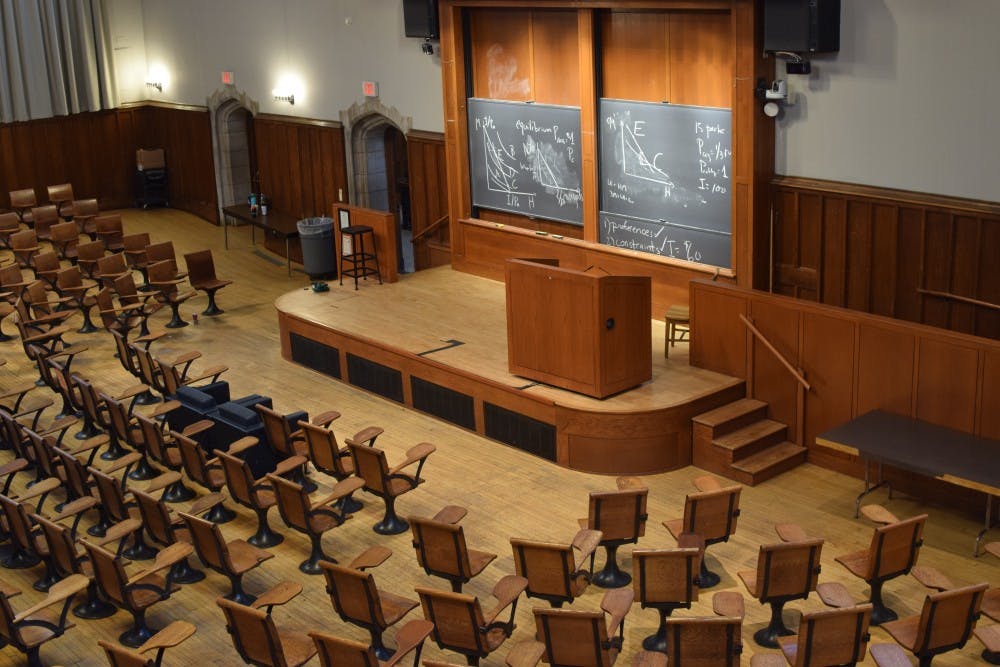It turns out that Sen. Bernie Sanders (I-Vt.) had a plan for my third and final opinion column this semester. The College for All Act 2021, introduced last week by Sanders and Rep. Pramila Jayapal (D-Wash.), promises to be the #NewDeal4HigherEducation that America’s public colleges and universities need.
The act, if passed by Congress, would make community college free for all Americans, while undergraduate education at four-year public institutions and at private Historically-Black Colleges and Universities, Hispanic-Serving Institutions, Tribal Colleges and Universities, and Asian American- and Native American Pacific Islander-Serving Institutions would be free for all families making less than $125,000 annually. It would also double the maximum Pell Grant to $12,990 and triple funding for low-income and first-generation students and students with disabilities.
This ambitious proposal would be funded with federal dollars — exactly what organizers behind the #NewDeal4HigherEducation have advocated in the wake of the COVID-19 pandemic. In Sanders’s and Jayapal’s proposed bill, the federal government would pay 75 percent of the cost of the plan with states covering the remaining 25 percent. Federal funding would come from a new Tax on Wall Street Speculation Act, which imposes a very low tax rate (between 0.005 and 0.5 percent) on individual trades of stocks, bonds, and derivatives and could raise up to $240 billion in revenue annually.
Given that Americans are currently facing more than $1.7 trillion in student loans, it makes perfect sense that reporting on the College for All Act has tended to focus on the bill’s potential to end the student debt crisis once and for all. But while reducing the cost of a college education is a first step toward fixing America’s broken higher education sector, we have to make sure that a free college education is still an excellent education.
As I argued in my last column, an excellent college education comes when students are engaged in their academics. I cited this 2018 Stanford report, which demonstrates that college ranking matters less than campus culture as a determinant of students’ success. The report lists six college experiences shared by people who report finding success after college. The top three are: “taking a course with a professor who makes learning exciting”; “working with professors who care about students personally”; and “finding a mentor who encourages students to pursue personal goals.” Professors, as it turns out, are pretty important when it comes to creating an excellent college experience.
So in this, my final opinion column, I’m going to talk about how the crisis in higher education funding has affected college professors and draw your attention to two provisions in the College for All Act that have so far received little public attention.
Tucked away on page 26 of the bill are two important clauses which dictate the terms by which State and Tribal Colleges or Universities can receive federal funding. First, within five years of the start of the program, 75 percent of instruction at universities that accept funding must be “provided by tenure-track or tenured faculty.” And second, to reach that goal of 75 percent tenured instruction, universities must “make it a priority to hire existing adjunct, contract, contingent, and non-tenure track” faculty for tenured tenure-track or tenured faculty positions.
What does all this mean, precisely? It means that the College for All Act recognizes that restoring the quality of American public higher education means ensuring that America’s educators earn a living wage. Sadly, for the majority of college educators, that simply isn’t the case.

First, a little vocabulary for those of you not well-versed in academic terminology. The difference between tenure-track and non-tenure track faculty is that tenure-track faculty positions are full-time, permanent positions. At most institutions, after a seven-year review period in which a professor demonstrates that she has met the research and teaching standards of her field, she receives tenure and gains life-long job security.
By contrast, adjunct, contract, contingent, and other non-tenure track faculty positions are often part-time positions with short-term contracts renewable (or not) every semester. Most of these positions come with no benefits, and these professors are paid anywhere from $2,000 to $7,000 per class taught per semester. A 2020 report conducted by the American Federation of Teachers found that one-third of adjunct faculty in the United States earn less than $25,000 annually — below the federal poverty line — and 25 percent rely on public assistance.
From your experiences here at Princeton, where faculty are well-compensated and short-term contracts are uncommon, you might imagine that tenure-track or tenured faculty far outnumber adjunct faculty at other American colleges and universities. You’d be wrong. Whereas in 1969, 80 percent of faculty at American institutions were tenured or tenure-track, today it’s the opposite: 75 percent of faculty are in contingent positions as adjuncts.
Most of these adjunct faculty have the same credentials as professors with tenure: a Ph.D. in their field, research publications, and teaching experience. A student taking classes with both an adjunct and a tenured professor would likely find it impossible to determine which professor held which position. From the student’s perspective, both professors do the same job: each one teaches class, grades assignments, and offers academic guidance. But from the professor’s perspective, the differences couldn’t be more stark: one position comes with a salary and benefits and job security, and the other doesn’t. The adjunct professor might be shuttling between multiple institutions teaching three times the number of classes as the tenured professor while still unable to make ends meet.

You won’t find most adjunct professors talking openly with undergraduates about their precarious financial position, in part because there’s a feeling of shame that comes with poverty. In an academic climate still governed by the myth of meritocracy, speaking plainly about exploitative working conditions can feel like an admission of failure. But the truth is that drastic cuts to higher education funding have made exploitative working conditions the norm rather than the exception at many of America’s colleges and universities.
But adjunct positions don’t just hurt the professors who hold them. They hurt students too. The massive cuts to humanities departments I discussed in my last column are made possible by universities’ reliance on adjunct labor. Why pay three full-time tenured faculty and maintain a German department when you can hire a single adjunct to teach all their classes at half (or less) the price? Teaching up to seven courses a semester and grading maybe 200 students’ assignments, that adjunct faculty member has no time to mentor students and no time to stay up to date on the latest research to bring to the classroom. In short, they have no time to provide the kind of college experiences that research has shown to be critical for fostering student engagement.
Both students and exploited professors need Congressional action that addresses all the many broken parts of American higher education, from skyrocketing tuition rates to cratering faculty wages. The College for All Act is the answer. President Biden’s American Families Plan, just announced last Wednesday in his address to Congress, includes scaled-back versions of many of the proposals within the College for All Act, but no provisions to address the exploitative working conditions in higher ed. It’s simply not enough.
Sanders and Jayapal recognize that America’s students cannot hope to receive an excellent education from faculty who are overworked and vastly underpaid, no matter how talented or smart or driven their adjunct professors are. By tying federal funding to the end of the “adjunctification” of American higher ed, the College for All Act is the #NewDeal4HigherEducation that America’s students and its educators deserve.
Melissa Reynolds is the Perkins-Cotsen Postdoctoral Fellow in the Society of Fellows in the Liberal Arts and Lecturer in the History Department and Humanities Council. She can be reached at melissa.reynolds@princeton.edu.








